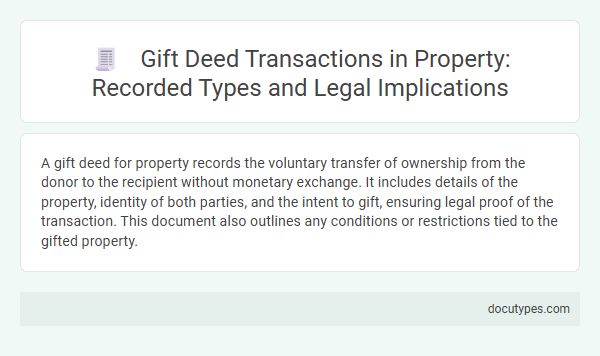A gift deed for property records the voluntary transfer of ownership from the donor to the recipient without monetary exchange. It includes details of the property, identity of both parties, and the intent to gift, ensuring legal proof of the transaction. This document also outlines any conditions or restrictions tied to the gifted property.
Introduction to Gift Deed Transactions in Property
A gift deed is a legal document used to transfer property ownership without any monetary exchange. Understanding the types of transactions recorded helps you ensure proper recording and legal compliance.
- Property Transfer Between Family Members - Records the voluntary transfer of land, house, or other real estate as a gift within family relations.
- Transfer Without Consideration - Documents transactions where no payment or compensation is involved, emphasizing the gratuitous nature of the transfer.
- Transfer to Charitable Organizations - Records the gifting of property to registered trusts, societies, or NGOs for charitable purposes.
Accurate documentation in a gift deed protects the rights of both donor and donee during property transfer transactions.
Legal Definition of Gift Deed
A gift deed is a legal document that transfers ownership of property from one person to another without any exchange of money. It records voluntary transactions where the transferor willingly gifts the property to the transferee.
The legal definition of a gift deed emphasizes the gratuitous nature of the transfer and requires clear intent to gift. Your property rights are legally conveyed through this document under specified conditions.
- Transfer of ownership - The gift deed records the transfer of property rights from the donor to the recipient without consideration.
- Voluntary transaction - It captures the donor's free will and intention to gift the property without coercion.
- Legal validation - The deed serves as proof of gift and is legally enforceable after proper registration and acceptance.
Essential Elements of a Valid Gift Deed
A gift deed for property records the voluntary transfer of ownership without monetary consideration, specifying the donor and donee details. Essential elements include a clear intention to gift, a detailed description of the property, and acceptance by the donee during the donor's lifetime. You must ensure the deed is registered to validate the transaction legally and prevent future disputes.
Types of Property Eligible for Gift Deed
| Type of Property | Description |
|---|---|
| Immovable Property | Includes land, residential houses, apartments, commercial buildings, and plots. All immovable property can be gifted through a gift deed, ensuring the legal transfer of ownership without monetary consideration. |
| Movable Property | Typically includes vehicles, jewelry, and valuable goods. Although less common, movable properties can also be transferred via a gift deed depending on local laws. |
| Rights and Interests | Rights in a property such as leasehold rights, easements, or tenancy rights can be gifted. This allows transfer of partial interests or usage rights in a property without transferring full ownership. |
| Shares in Property | Your share in jointly owned property, including inherited assets or co-owned real estate, can be gifted to another person using a gift deed. |
| Undivided Interest | Gifting an undivided interest in a property refers to transferring a specific fractional ownership, common in co-owned properties or family holdings. |
Recorded Types of Gift Deed Transactions
Gift deeds record specific types of property transactions where ownership is transferred without monetary exchange. These documents legally document the voluntary transfer of property as a gift from one party to another.
Recorded types of gift deed transactions typically include transferring residential or commercial real estate between family members or close associates. This can involve outright gifting of land, buildings, or a combination of both. You must ensure that the gift deed clearly specifies the nature of the transaction to validate the transfer under the law.
Legal Procedures for Executing a Gift Deed
What types of transactions are recorded in a gift deed for property? A gift deed primarily records the voluntary transfer of ownership of property from one person (the donor) to another (the donee) without any monetary consideration. It legally documents the intent to gift immovable property such as land, house, or building.
What are the key legal procedures for executing a gift deed? The execution involves drafting the deed clearly stating the donor and donee details, the description of the gifted property, and the declaration of voluntary gift. The deed must be signed by the donor, accepted by the donee, and registered with the local sub-registrar office as per the Registration Act, accompanied by payment of applicable stamp duty.
Stamp Duty and Registration Requirements
A gift deed for property records the voluntary transfer of ownership without monetary consideration. It legally documents the gift of immovable property from the donor to the donee.
Stamp duty on gift deeds varies by state, often lower than sale deeds, but compliance with local laws is crucial. Registration of the gift deed at the sub-registrar's office ensures legal recognition and protection of ownership rights.
Rights and Liabilities of Donor and Donee
A gift deed for property records the voluntary transfer of ownership rights from the donor to the donee without monetary consideration. It legally documents the relinquishment of the donor's title and the acceptance of the donee's ownership rights.
The donor retains no rights or liabilities over the property once the gift deed is executed, ensuring full transfer of possession and interest. The donee assumes all rights, responsibilities, and liabilities associated with the property from the date of transfer.
Legal Implications and Challenges of Gift Deeds
A gift deed for property records the transfer of ownership from the donor to the recipient without monetary exchange. Legal implications include ensuring the deed is executed voluntarily, registered properly, and free from coercion or fraud to avoid future disputes. Challenges often involve establishing the genuineness of the gift, addressing tax liabilities, and resolving conflicts in ownership claims.
What Types of Transactions Are Recorded in a Gift Deed for Property? Infographic

